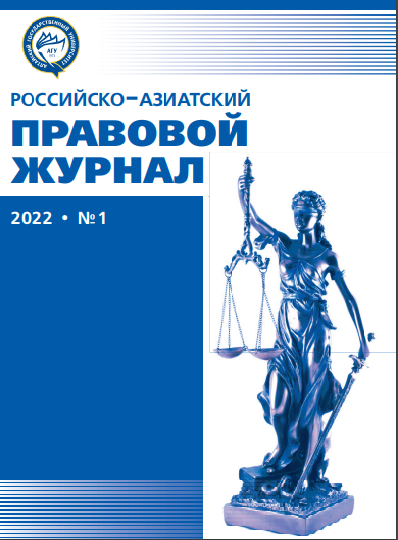THEORETICAL FOUNDATIONS FOR DETERMINING THE OBJECT OF COERCION TO COMMIT A TRANSACTION OR REFUSAL TO COMMIT IT (ARTICLE 179 OF THE CRIMINAL CODE OF THE RUSSIAN FEDERATION)
УДК 343.791 ББК 67.408
Abstract
The reform of Russian criminal law is an objective need due to a number of objective factors. Thisprocess is obviously extremely complex, requiring a deep analysis of the current legislation, the practice ofits application, as well as the position of the doctrine of criminal law. For a long time, Russian legislationwas largely based on constructions borrowed from foreign codes and laws. Currently, Russia has its ownsignificant experience in lawmaking and law enforcement. At the initial stage of improving the criminallaw, it is necessary to build its system, which will determine the model of criminal law protection of certainpublic relations. The structure of the new criminal law should be based on clearly formulated elements ofcrimes based on the analysis of the signs of the object of criminal encroachment. It is the object of the crimethat is the traditional basis of Russian criminal law. In this paper, the author studies the object of coercion tocommit a transaction and, based on the studied theoretical and practical material, comes to the conclusionthat public relations protected by Article 179 of the Criminal Code of the Russian Federation are not limitedexclusively to economic activity, but may arise in other areas, including personal, family relationships. Thisallows us to conclude that it is necessary to formulate responsibility for forcing a transaction in other chaptersof the criminal law.
Downloads
References
Хакулов М.Х. Преступления, посягающие на свободу и добросовестность конкуренции в сфере предпринимательской деятельности : автореф. дис. … д-ра юрид. наук. М., 2009. 28 с.
Гладких В.И. Некоторые проблемы квалификации принуждения к совершению сделки или отказу в ее совершении // Безопасность бизнеса. 2014. №2. С. 25–30.
Клепицкий И.А. Система хозяйственных преступлений // Справочно-правовая система Консультант Плюс.
Хилюта В.В. Всегда ли преступно принуждение к совершению сделки? // Законность. 2013. №2. С. 48–49.
Подузова Е.Б. Квалификация договора в российской и англосаксонской правовых семьях // Lex russica. 2016. №9. С. 114–128.
Долинская В.В. Понятие и классификации юридических фактов: очерк систематизации // Законы России: опыт, анализ, практика. 2018. №4. С. 91–103.
Арямов А.А., Кривов А.В., Руева Е.О. Межотраслевая корреспондируемость: проблемы законодательной техники в уголовном праве // Российский следователь. 2021. №6. С. 17–20.
Летова Н.В. Особенности регулирования сделок в сфере семейных отношений // Труды Института государства и права Российской академии наук. 2016. №6. С. 134–149.
Агашев Д.В. О проблеме формирования института сделок в трудовом праве России // Вестник Томского государственного университета. Серия: Право. 2012. №2 (4). С. 55–66.
Лукашева Е.А. Права человека и принципы глобализации современного мира. М., 2007. 462 с.
Russian-Asian Law Journal is a golden publisher, as we allow self-archiving, but most importantly we are fully transparent about your rights.
Authors may present and discuss their findings ahead of publication: at scientific conferences, on preprint servers, in public databases, and in blogs, wikis, tweets, and other informal communication channels.
Russian-Asian Law Journal allows authors to deposit manuscripts (currently under review or those for intended submission) in non-commercial, pre-print servers such as ArXiv.
Authors who publish with this journal agree to the following terms:
- Authors retain copyright and grant the journal right of first publication with the work simultaneously licensed under a Creative Commons Attribution License that allows others to share the work with an acknowledgement of the work's authorship and initial publication in this journal.
- Authors are able to enter into separate, additional contractual arrangements for the non-exclusive distribution of the journal's published version of the work (e.g., post it to an institutional repository or publish it in a book), with an acknowledgement of its initial publication in this journal.
- Authors are permitted and encouraged to post their work online (e.g., in institutional repositories or on their website) prior to and during the submission process, as it can lead to productive exchanges, as well as earlier and greater citation of published work (See The Effect of Open Access).








